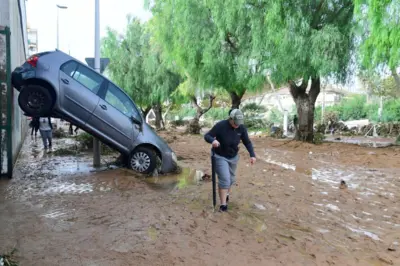We've updated our Privacy and Cookies Policy
We've made some important changes to our Privacy and Cookies Policy and we want you to know what this means for you and your data.
Irish government comes under fire from students
- Author, Mark Simpson
- Role, 91»»Ī¨ Ireland Correspondent
Plans to increase university fees have triggered clashes between Irish riot police and students in Dublin city centre - but there are wider implications.
The Irish government is not just facing street protests from students angry at planned rises to university fees, but the threat of a graduate "brain drain".
More than 20,000 young people demonstrated on the streets of Dublin and many of them wore T-shirts saying "Education not Emigration".
Just like in the UK, students in Ireland say they do not see why they should have to take a share of the economic pain caused by bankers and politicians.
Red paint was thrown at an Irish government minister on Monday and there was some trouble at Wednesday's student protest in Dublin city centre, but most of the demonstrations have been angry rather than violent.
Escape through emigration
With the Irish unemployment rate at 13.6%, one student carried a poster which said "Heigh ho, heigh ho, it's onto the dole I go".
Another simply waved a piece of paper, with a scribbled note stating "I couldn't even afford a poster".
Others joked about turning to drug-dealing or prostitution to earn some cash, and wore placards advertising their services.
Well, I assume they were joking.
Student groups claim that 100 graduates a week are emigrating. Australia and New Zealand are the most popular destinations but many are opting simply to hop across the Irish Sea to England, in spite of the UK's economic woes.
Irish people are normally resilient, as they proved at the time of the famine and the civil war.
Now comes what is being seen as the country's biggest challenge for 80 years - retaining its economic sovereignty and solvency.
The country's coalition government is trying to build confidence in itself, as well as the Irish economy.
With record lows in opinion polls, and a majority of only three in the Irish parliament, it must urgently find support at home and abroad.
The European Union, the European Central Bank and the international bond markets need to be convinced that Ireland can battle its own way out of its current economic mess.
Empty pockets
By the middle of this month, Ireland has to tell the EU how it plans to make those huge savings. The European Commissioner for Economic and Monetary Affairs, Olli Rehn, is due to visit Dublin next week.
The following week, Ireland's Finance Minister Brian Lenihan will produce his four-year economic plan.
That will contain the broad outline of the Irish financial rescue scheme. More details will then follow on 7 December when Mr Lenihan presents his budget for next year to the Irish parliament.
It is expected to be severe. The Irish Daily Mail has already dubbed it "the budget to fleece us all".
Welfare payments look likely to be hit, taxes will go up and public spending will go down.
Fees for third-level education are set to go up as part of the cuts package. It has been suggested the charge could rise from its current level of 1,500 euros to 2,500 euros.
That is why students from all over the country gathered in protest on the streets of Dublin.
It is unlikely that their demonstration will make any difference.
As in most countries, most Irish ministers used to be involved in student politics.
They have sympathy for young students and new graduates, but the government's pockets are empty.
They will be hoping that young people will eventually accept this. After all, most students know what it feels like to be broke.
Top Stories
More to explore
Most read
Content is not available








